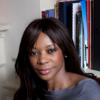Dambisa Moyo

Dambisa Moyo
Dambisa Moyo2 February 1969) is a Zambian-born international economist and author who analyzes the macroeconomy and global affairs. With post-graduate degrees in business, public administration, and economics from American University, Harvard, and Oxford, Moyo currently serves on the boards of Barclays Bank, the financial services group, SABMiller, the global brewer, and Barrick Gold, the global miner. She worked for two years at the World Bank and eight years at Goldman Sachs before becoming an author and international public speaker. She...
NationalityZambian
ProfessionEconomist
Date of Birth2 February 1969
CountryZambia
There's not a single country that actually approaches economics in a pure, free market, capitalist way. I like the free market - but it very much exists only in textbooks. If I had a choice, and we could live in a very pure world, I would be a supporter of the free markets.
I had the good fortune to spend hours with my parents around the dinner table having debates on politics and economics.
China is attempting the death-defying feat, which no one has attempted in the history of the world, which is to move a billion people out of poverty. When I speak to Chinese policy-makers, the thing that annoys them the most about Western policy-makers is that they're not given any credit for anything.
Many Africans succumb to the idea that they can't do things because of what society says. Images of Africa are negative - war, corruption, poverty. We need to be proud of our culture.
The World Bank can only survive if it's spending money.
The western mindset erroneously equates a political system of multi-party democracy with high-quality institutions... the two are not synonymous.
The most obvious criticism of aid is its links to rampant corruption. Aid flows destined to help the average African end up supporting bloated bureaucracies in the form of the poor-country governments and donor-funded non-governmental organizations.
This is my favourite thing about being raised in Africa: we don't do labels very well; we don't do this, 'Oh, you're a Democrat; oh, you're a Republican.' Because we live in the real world.
I went into the sciences very early on, but to me, economics pervades so much more of our lives and our existence.
I am fortunate: my parents told me the world was my oyster, when they could have said I wouldn't make it for a lot of reasons - rural, girl, small African country. So, no regrets.
Thanks to aid, a distressing number of African leaders care little about what their citizens want or need - after all it's the reverse of the Boston tea-party - no representation without taxation.
I was initially very interested in public policy, but then after my masters at Harvard, I felt that it was important to get a better handle on the economics of it as well. I did my Ph.D. in macroeconomics, and my thesis - 'Why Is It That Some Countries Save And Others Not?' - was on savings.
I don't think my background in Zambia has really affected my lens because my classical training has been Western-style. But it's fantastically fortuitous to have been born African because I don't feel I have a vested interest to the U.S. or China or wherever.
'Dead Aid' is about the inefficacy and the limitations of large-scale aid programs in creating economic growth and reducing poverty in Africa.